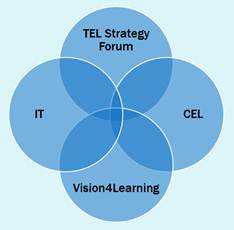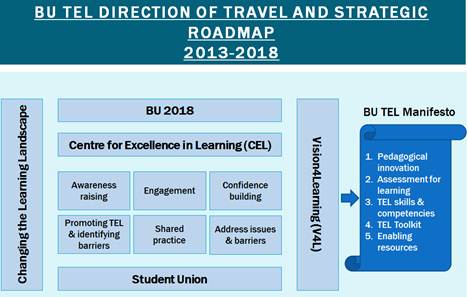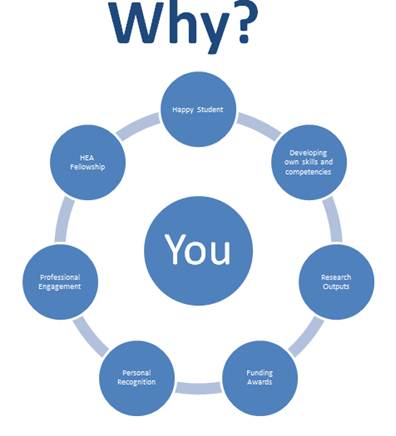The V4L project is driven by BU academics for BU academics to enable and share pedagogical innovation. There are a number of elements to the project such as the tender for the Virtual Learning Environment (VLE), the Technology Enhanced Learning (TEL) Toolkit and the Service Design review of the Learning Technologists. To deliver against these elements, the project team is working with key stakeholders (see Fig. 1) who play an instrumental role in the University’s vision to deliver excellent learning (S4. Our fusion will deliver inspirational teaching using the latest technology in world-class facilities).
Fig. 1 – Relationship between key stakeholders
 Enhancing the quality of learning and teaching remains the top most important factor for developing TEL in institutions in the UK (UCISA TEL Survey 2014) and the direction of travel for Vision4Learning as underpinned by CEL is to develop a stimulating environment for consistent enhancement in student learning experience.
Enhancing the quality of learning and teaching remains the top most important factor for developing TEL in institutions in the UK (UCISA TEL Survey 2014) and the direction of travel for Vision4Learning as underpinned by CEL is to develop a stimulating environment for consistent enhancement in student learning experience.
Academics are increasingly engaging with a wider range of technologies to promote their activities and support their own, and student engagement with a discipline. Building capacity through shared staff/student ownership and use of such technologies will enable the creation of enhanced learning opportunities, and staff and students will be supported and more empowered to create enhanced learning opportunities (see Fig. 2).
Fig. 2 – BU TEL Direction of Travel and Strategic Roadmap 2013-2018

Technology Enhanced Learning (TEL)
As you will be aware, the TEL Toolkit launched week commencing 1 February 2016. The TEL Toolkit brings together all the tools currently in use across BU and links them to the pedagogies for which they may be most usefully applied, in addition there are links to research articles and talking head videos of academics sharing how they have successfully used them. See here for more information. As part of the launch a video was created to share BU’s vision for TEL which is available here.
Late in 2015 the Government published a white paper making clear its intentions for the Teaching Excellence Framework and providing guidance for what it will mean for the HE landscape in the future. At BU we are slightly ahead of the curve with the work that has already been initiated both from the TEL Strategy Forum and the Centre for Excellence in Learning (CEL). The TEL Toolkit will support these initiatives and continue our advancement ahead of the Government’s plans being finalised.
Virtual Learning Environment (VLE)
Over recent months many people have provided their input to shaping the VLE tender documents, including academics, IT, Procurement, Learning Technologists and SUBU to name but a few. Due to the potential value of the contract procurement regulations necessitate an EU tender process. Compliance with the EU tender requirements mean this will take until early 2016/17 academic year to agree what BU’s future VLE will be and at this point implementation plans will be defined. To ensure a smooth integration with BU’s other systems, it is anticipated that this will complete late in 2017/2018 academic year.
In the interim, the V4L project team will be working with other stakeholders to exploit Blackboard to the fullest extent as the system has much greater capability than BU currently use and the intention is to fully explore additional functionality.
Sharing Practice
Watch out for opportunities to share good practice in pedagogical approaches. Details will be available on the TEL Toolkit, CEL Blog and Staff Intranet.
Engaging with TEL
Why would you want to engage with your TEL Toolkit? There are 7 strong reasons below (and see Fig. 3):
 Happy students is at the top of the ‘Why?’ list. Engaging students through TEL is a great way to offer a varied approach to teaching and learning and make the experience enjoyable for and beneficial to students.
Happy students is at the top of the ‘Why?’ list. Engaging students through TEL is a great way to offer a varied approach to teaching and learning and make the experience enjoyable for and beneficial to students.
- To further develop your own skills, competencies and confidence in using TEL tools and your teaching and learning pedagogy. The toolkit will be available either by tool (How do I use Panopto?) and also pedagogically (How can I better engage students?) so that you can learn more about the available tools and also explore news ways to teach.
- To facilitate new learnings and experiences that could be used as the basis for research outputs.
- As the basis for seeking internal or external funding. The CEL FIF call is a recent example.
- To receive personal and professional recognition for your expertise using the tools. This may include awards such as the Learning and Teaching Fellowship or be used in appraisals and for pay/grade progression.
- To enhance your professional capabilities and engagement.
- If you are seeking a HEA fellowship or higher levels of membership, you could use the toolkit to develop or enhance your skills and use these achievements to support your application.
What can we do for you?
If there is anything else you believe the V4L project team should be considering in addition to or an extension of what is already mentioned here, please email v4l@bournemouth.ac.uk with your suggestions.








